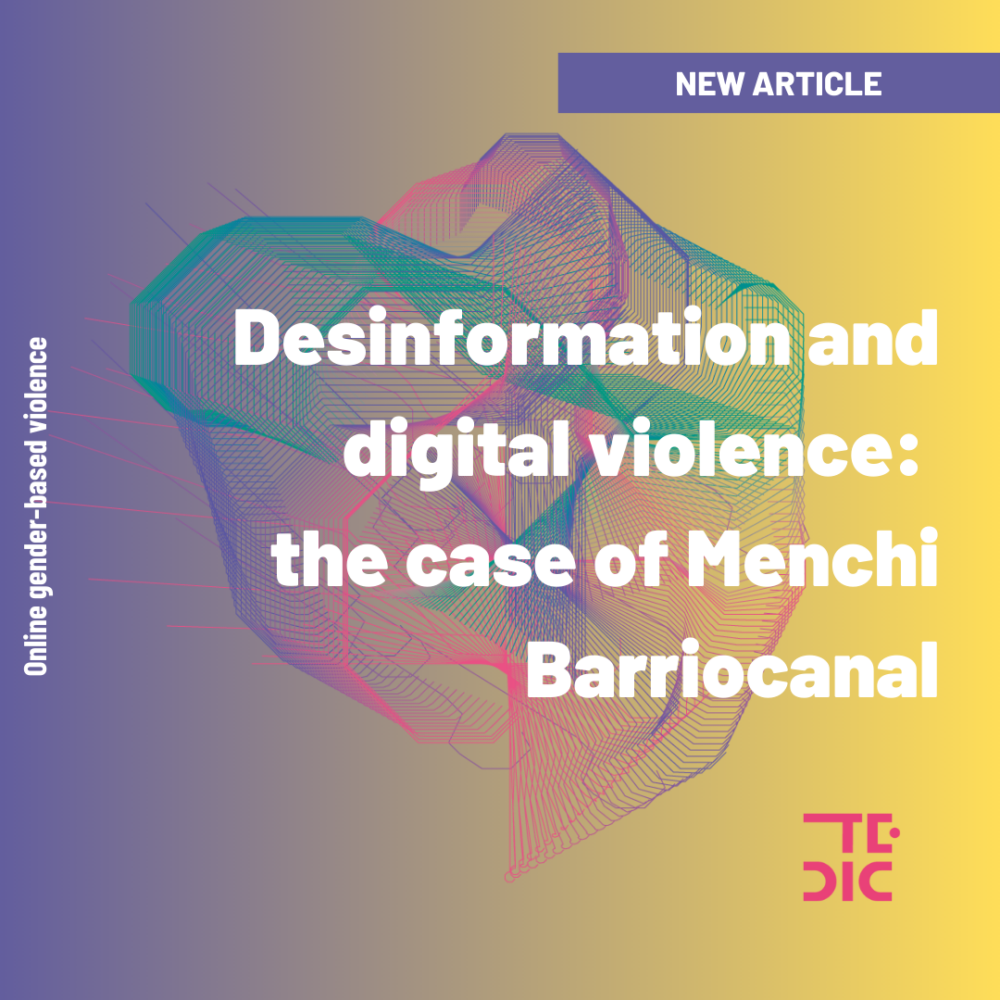
According to the Report on online gender-based violence against women with a public voice (2022) the threats, harassment, hate speech and disinformation campaigns -among so many other types of online gender-based violence1– coincide in time with the emergence and spread of the so-called fourth-wave feminism, which reinstated the debate on the decriminalisation and legalisation of abortion, achieving concrete legislative advances and affirmative actions for the political representation of women and diverse groups.
In this context, online gender-based violence appears as a tool to silence voices, and its intensity increases during election time, when extremist discourse and misinformation increase, affecting many women around the world, and Paraguay is no exception.
Although the feminist struggle has made significant progress in Paraguay, we are currently facing an increasingly worrying advance of anti-rights groups that seek to undo the gains already achieved. For this reason, we believe it is essential to understand their forms of action in order to make their repercussions visible and collectively confront the various forms of violence they perpetrate.
The case of Menchi: an example of the impact of disinformation campaigns
Menchi is a journalist, radio host, and television presenter with more than three decades of experience, a beacon of freedom of expression, and an advocate of dialogue and public debate in Paraguay. Her work has been recognised by international organisations: UNICEF appointed her as a National Ambassador for Paraguay in 2005 and Amnesty International awarded her the Peter Benenson Award for her “Jornalistic work commited to human rights” given her invaluable support from her role as a journalist in the defence of human rights in general, but in particular on matters of children and adolescents, gender, LGTBIQ+ people and peasant communities.
Since 2018, Menchi began to receive systematic attacks from anti-rights groups (self-described as pro-life) who began to question her participation in Teleton, a foundation that helps children with disabilities. The reactive response she faced in 2018 would begin a series of attacks by these groups, marking a turning point in her career. The attacks were triggered by the installation and use of the hashtag #MenchiNoTeQueremosEnTeletón (#MenchiWeDoNotWantYouInTeletón) to spread messages of hate and accuse her of being a hypocrite for defending the reproductive freedom in tandem to her activism in favour of children’s and adolescents’ rights, an approach by these anti-rights groups based on prejudice and denial of the rights guaranteed in the The Universal Declaration of Human Rights.
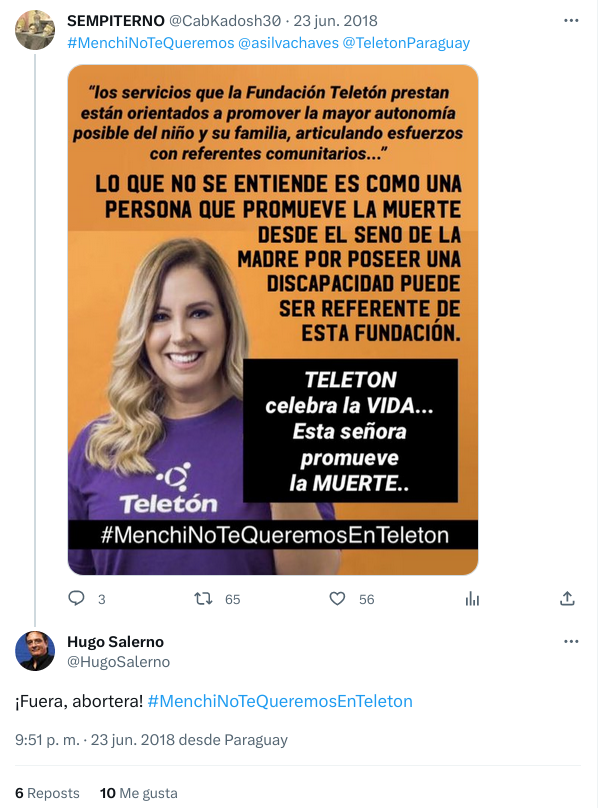
In response, Menchi published a video clarifying that his role as a journalist is to generate spaces for dialogue and debate in an unequal and conservative society such as Paraguay.
In an interview in the special edition “Women Leaders in Journalism and Communication in Paraguay” of the television program Algo Anda Mal (AAM), Menchi revealed that, due to these attacks, she felt compelled to step away from the social media platform Twitter. She explained that one of the driving factors behind her decision was the constant online harassment experienced by female journalists. This retreat from a public discussion space like social media, in light of the growing prevalence of hate speech, harassment, and other forms of online violence, illustrates a primary consequence of the advancements made by anti-rights groups: the censorship and suppression of feminist voices.
There is harassment on social media when someone expresses an opinion, and this is what needs to be addressed through a public, secular, and high-quality education. There is growing hostility and tension, as if it were a war where someone has to die. We can have differences of opinion, but do not insult or slander me just because you disagree with me
Menchi Barriocanal
That same year, she reported that several companies attempted to pressure Teletón Paraguay to remove her as the public face of the organisation, threatening to cease their financial support if they did not comply. Although, at the time, these companies did not succeed in getting Teletón to remove her as its public representative, this exemplifies how the proliferation of disinformation campaigns and various forms of gender-based violence online over a significant period of time has an impact on public perception. Unfortunately, this situation ultimately had a detrimental effect on the professional performance of the involved journalist.
Digital violence and disinformation: a long-term battle.
These actions towards Menchi were not isolated incidents but rather became part of a process that evolved and developed over an extended period of time, becoming more pronounced during periods when the journalist took public stances on certain issues.
In Menchi’s case, the attacks that began in 2018 reached a peak of intensity, escalating into even more direct attacks in November 2022. During that time, the journalist was deluged with offensive and violent messages stemming from her stance against the repeal of the agreement with the European Union for the funding of school meals, a measure she believed would adversely affect children in Paraguay.
The perpetrators, once again self-identifying as pro-life, exploited the prevailing sexism and embedded gender biases to discredit her, portraying her once more as a threat to the stated values of Paraguayan society declared as “Pro life and Pro family”. These actions, which began in 2018, increased in frequency and intensity, culminating in 2022 with hate messages inciting persecution and violence against the journalist.
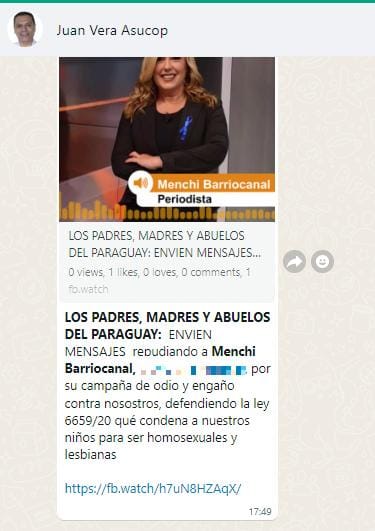
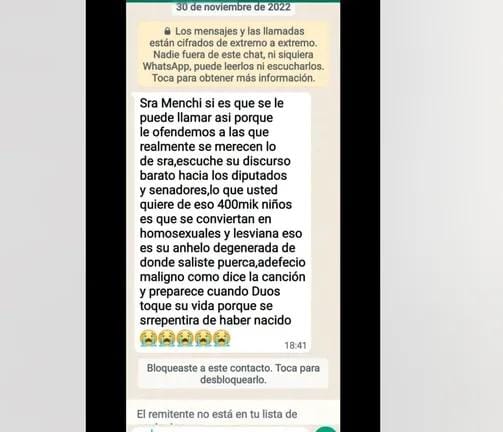
The primary instigator of this hate campaign against Menchi was Juan Vera, a consumer rights activist and evangelist who even went as far as to publish Menchi’s phone number, enabling others to bombard her with offensive messages, an action known as “doxing” o “doxxing”. The systematic harassment campaign and death threats against the journalist aimed to silence her voice and tarnish her reputation, jeopardising her ability to inform the public, which is a fundamental pillar of any functioning democracy
The impact of the disinformation campaigns on Menchi was severe, both personally and professionally. Emotionally distressed, she again withdrew from her social media platforms and took a break from public life. This time, unlike in 2018, her capacity to champion significant causes like UNICEF and Teletón was affected. She lost these influential spaces where her voice had a substantial impact, no longer serving as the public face of these organisations.
In this regard, all the violence endured by Menchi and women journalists not only has personal consequences but also weakens the organizations and causes they represent and advocate for, destabilizing their influence and positive contributions in these spheres. It begs the question: do the impacts of disinformation campaigns and various forms of online violence affect men and women in the same way? Why do we observe greater consequences when these campaigns target women who show support for historically marginalized communities?
It seems that disinformation campaigns take on the role of “relegating us” back to a private space socially and structurally assigned to women, with no opportunity to publicly exercise our freedom of expression.
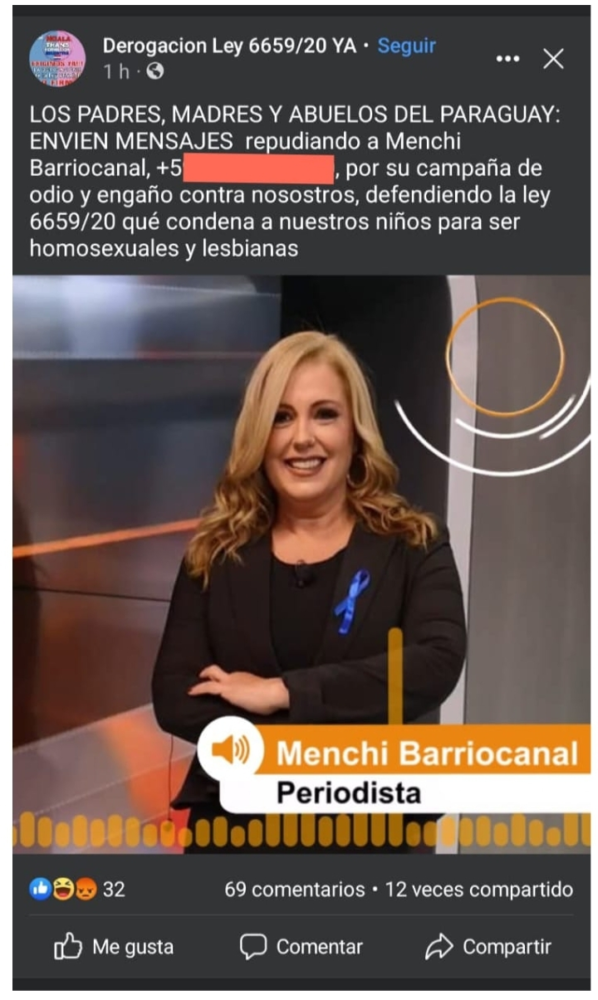
Disinformation campaigns: a gender-specific impact
TEDIC has presented Mechi´s case to the Office of the Special Rapporteur for Freedom of Expression. The Special Rapporteurship for Freedom of Expression, states that online violence and disinformation campaigns targeting women journalists have an inhibitory effect on the exercise of freedom of expression. While many women journalists choose to continue publishing information despite violence, threats, or harassment, others resort to self-censorship, close their digital accounts, or leave the profession.
According to what was indicated in the report (2021) by the Secretary-General of the United Nations, ‘attacks can also have a deterrent effect on other women journalists. The result is a lack of female perspectives and voices in the media on a wide range of issues, which has serious consequences for media freedom and diversity.’
It is clear that the main goal behind the ongoing digital violence targeted at Menchi, as a human rights advocate and a prominent public figure, is to undermine her credibility as a journalist and push her away from the public spaces she occupies in an attempt to silence her.
Discredit and disinformation campaigns have become a prevalent form of contemporary digital gender-based violence. These campaigns are frequently orchestrated by conservative groups with the aim not only to undermine the professional work of the journalists, but also to take a toll on their mental health, causing them emotional stress. Moreover, they succeed in diminishing the public visibility of journalists, not only by tarnishing their public image, but also by effectively silencing their voices.
These anti-rights and anti-democratic groups are known for using misinformation to spread fear around gender inclusion, amplifying hate messages that resonate on social media.
The importance of public voice in a conservative country.
Although Menchi won the court case against Juan Vera, setting an important national precedent, the digital violence directed at the journalist had the effect of removing her from political arenas where her presence represented a voice that challenged the prevailing conservative and anti-rights narratives in Paraguayan society. It is important for us, as human rights activists, to consider both sides of the coin: the feminist struggle can make progress, securing a legal response to this kind of violence, but what good is a legal response when the loss extends to other spaces?
In Menchi’s case, while we applaud the ruling issued by Judge Gustavo Enmanuel Villalba, who issued a protective order in support of the journalist–forbidding any form of violence, harassment, or intimidation against her, and consider it a precedent in countering the prevailing impunity surrounding these types of violence, we believe that it falls short of addressing the issue adequately.
As feminists and human rights advocates, we must continue to strive to find responses to the proliferation of disinformation campaigns by anti-rights groups that go beyond seeking only punitive solutions. The change must be structural. If we do not address the underlying foundations enabling the proliferation of various forms of online gender-based violence, the legal system will continue to function as a band-aid for a much deeper wound: the persistent inequality in our societies. Therefore, it is crucial to keep occupying and defending the strategic spaces we have gained, not allowing any backward steps regarding our hard-fought rights.
One of our challenges is to continue promoting and defending the diversity of ideas and voices, an increasingly daunting task for states, civil society, and media in a context where trust in information and democratic institutions is declining globally.
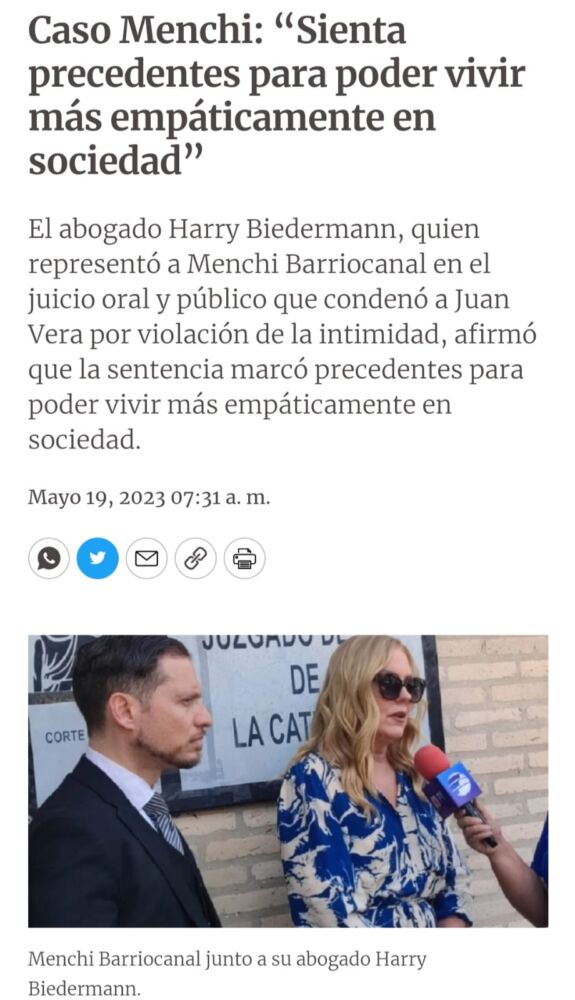
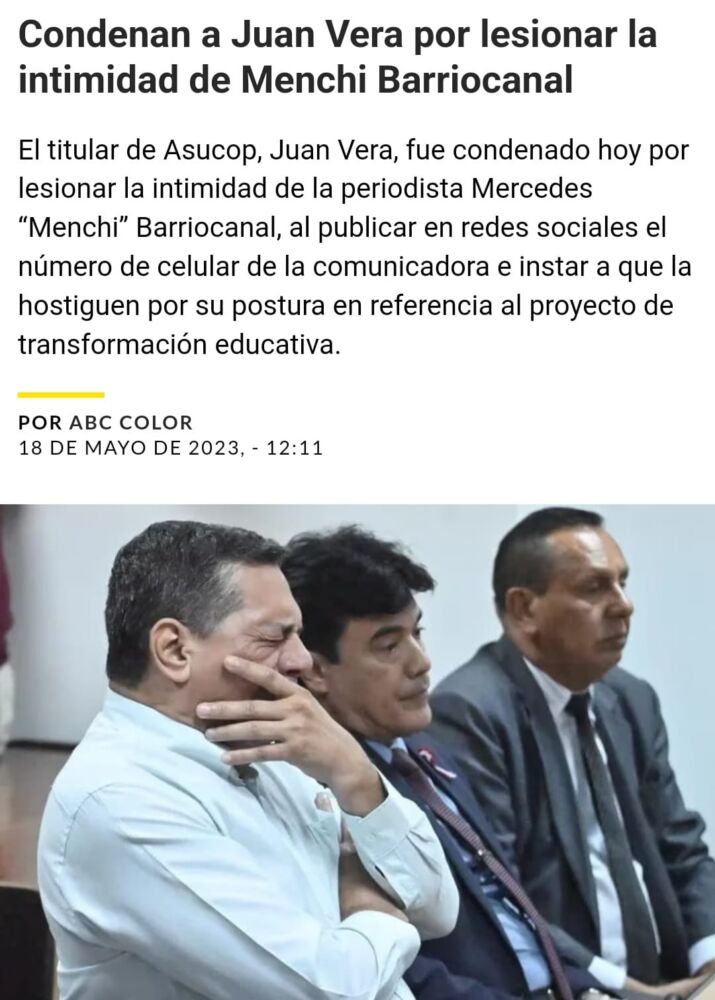
The experience of Mercedes “Menchi” Barriocanal sends a powerful message: No one should face intimidation or violence for exercising their freedom of expression. The fight against disinformation is not just about protecting individuals but about preserving the very essence of our democracies. The road is long, and the struggle continues, in the face of violence, MORE rights.
1TEDIC has been working on identifying more than 20 types of gender-based violence online since 2018, in collaboration with other regional and international organisations.

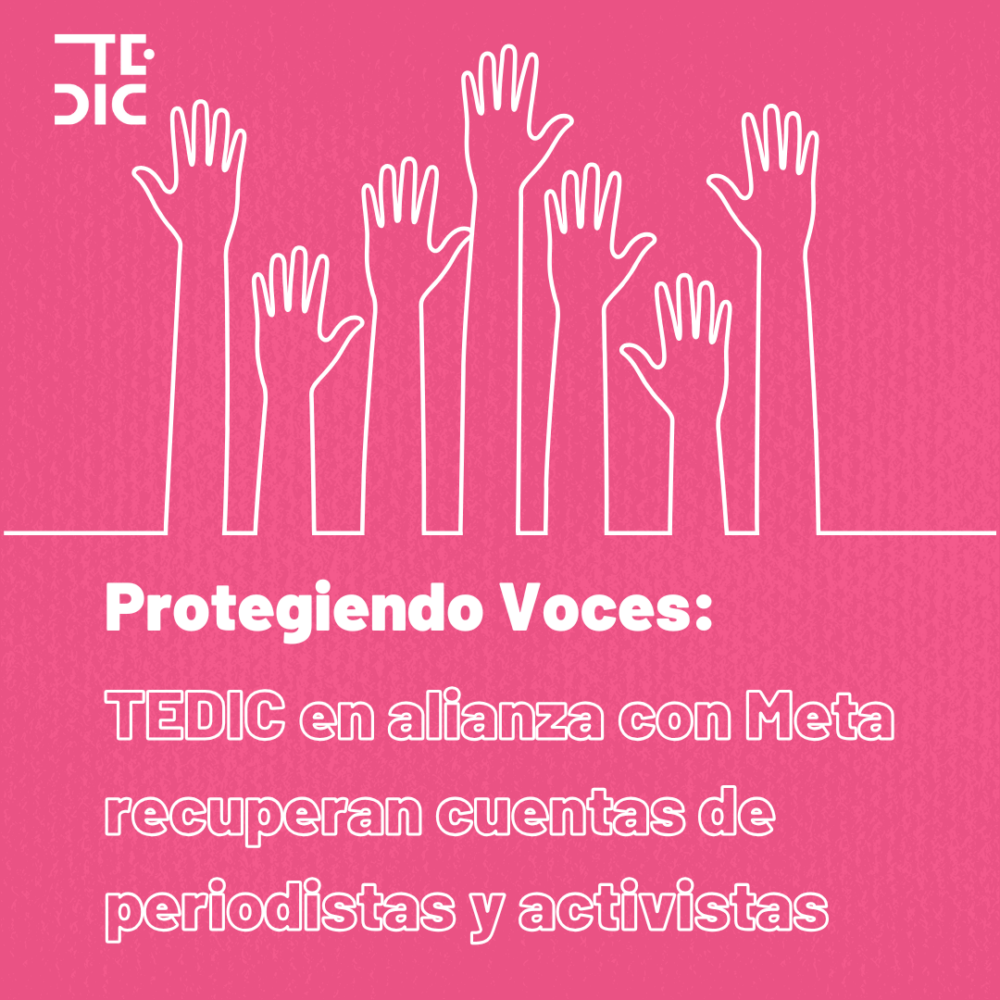 Defending those who defend us
Defending those who defend us  Regarding the trends in the Antipyrawebs Observatory in 2023
Regarding the trends in the Antipyrawebs Observatory in 2023